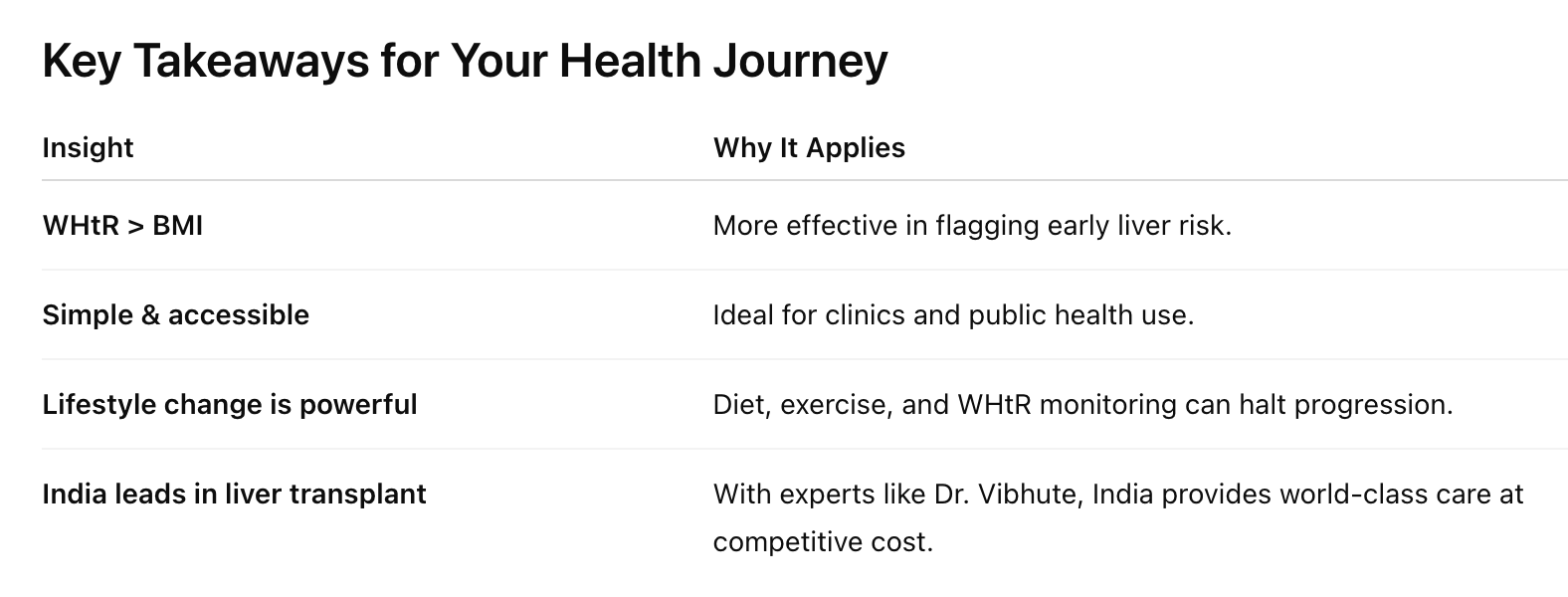Pravin Patole (Transplant Year: 2021)
Treatment : Liver Transplant
Saket Khadakkar (Transplant Year: 2021)
Treatment : Liver Transplant
Pravin Patole (Transplant Year: 2021)
Treatment : Liver Transplant
Saket Khadakkar (Transplant Year: 2021)
Treatment : Liver Transplant
Pravin Patole (Transplant Year: 2021)
Treatment : Liver Transplant
Saket Khadakkar (Transplant Year: 2021)
Treatment : Liver Transplant
Error: Contact form not found.
When assessing obesity and related health risks, Body Mass Index (BMI) has long been the go‑to metric. Yet emerging evidence shows it misses a critical factor: fat distribution. A recent study highlights that waist-to-height ratio (WHtR) is far superior to BMI at identifying individuals at risk of fatty liver disease and liver fibrosis.
Significant risk gradient:
BMI fell short: Compared to BMI, WHtR detected liver risk 1.6 to 6 times more effectively.
WHtR focuses on central or abdominal fat—a key driver of non-alcoholic fatty liver disease (NAFLD). In a large analysis of over 90,000 individuals, WHtR strongly discriminated between NAFLD patients and healthy controls. Among South Asians as well, WHtR proved more reliable than other indicators in detecting liver fat accumulation and early liver damage.
Dr. Bipin Vibhute, a leading liver transplant surgeon in India, emphasizes the practical value of WHtR. He states: “BMI may overlook patients with high visceral fat despite a normal body weight—these individuals are at risk for fatty liver disease.” Dr. Vibhute encourages adding WHtR measurements during routine screenings for early risk detection and prevention.
How to Measure WHtR
For more advanced cases, guidance from Dr. Vibhute includes: Fatty liver disease treatment, including medications, co-existing illness management, and specialized dietary plans.
In cases of fulminant liver failure or advanced cirrhosis, a liver transplant in India may be recommended. Dr. Bipin Vibhute, renowned for his work in this field, oversees:

“Combining waist-to-height ratio screening with targeted lifestyle interventions allows timely detection and management of fatty liver disease. This not only averts progression to cirrhosis but also offers a strong foundation for optimizing transplant outcomes, should they ever be needed,” Dr. Vibhute advises.
By combining smart screening tools like WHtR with expert medical advice, you can protect your liver and make informed decisions—whether that’s managing fatty liver or preparing for a liver transplant in India with confidence.
Recent Comments